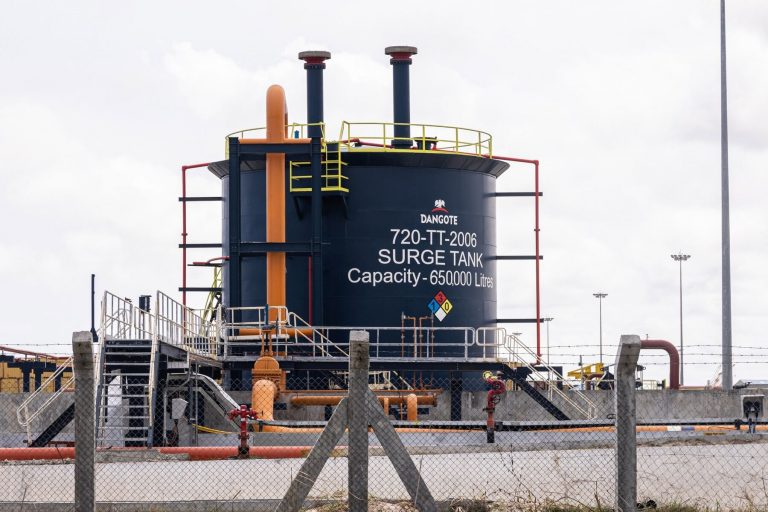
Nigeria’s ambitious plans to boost its local refining capacity are facing significant headwinds as the nation’s refineries, led by the Dangote Refinery, have raised their crude oil requirements to 597,700 barrels per day (bpd) for the second half of 2024.
This increase, a sharp rise from the 483,000 bpd demanded in the first half of the year, underscores the escalating needs of the domestic refining sector. However, it also highlights the growing challenge of securing adequate crude supplies, a situation that analysts warn could undermine Nigeria’s quest for self-sufficiency in refining.
Strain on Local Supply Chains
The Nigerian Upstream Petroleum Regulatory Commission (NUPRC) recently reported that in the first six months of the year, the country’s oil producers were able to deliver only 177,777 bpd to local refineries, falling dramatically short of the increased demand. This shortfall has sparked tensions between the Dangote Refinery and the NUPRC, particularly over the enforcement of the Petroleum Industry Act (PIA), which mandates the prioritization of crude supply to domestic refineries.
Tekedia Mini-MBA edition 16 (Feb 10 – May 3, 2025) opens registrations; register today for early bird discounts.
Tekedia AI in Business Masterclass opens registrations here.
Join Tekedia Capital Syndicate and invest in Africa’s finest startups here.
The Dangote Refinery, with its massive 650,000-bpd capacity, is expected to play a central role in reducing Nigeria’s reliance on imported petroleum products. However, the refinery’s spokesperson, Anthony Chiejina, has criticized the NUPRC for failing to enforce the PIA’s provisions.
According to Chiejina, the regulatory body has facilitated the sale of only one crude cargo between the refinery and domestic producers, leaving the refinery largely dependent on international traders.
“Aside from the term supply we bilaterally negotiated with NNPCL, so far NUPRC has only facilitated the purchase of one crude cargo from a domestic producer. The rest of the cargoes we have processed were purchased from international traders,” Chiejina stated.
He emphasized the importance of local refineries being able to buy crude directly from Nigerian producers rather than through international intermediaries, which complicates the supply chain and potentially drives up costs.
Chiejina further expressed frustration with the NUPRC’s justification for its inaction, citing the “sanctity of contracts” as an excuse for not enforcing the PIA.
“Unfortunately, the NUPRC has effectively admitted in their statement that they will be unable to enforce the domestic crude supply obligation as specified in the PIA, citing ‘sanctity of contracts’ as an excuse,” he added.
Analysts Express Concerns Over the Impact
Industry analysts have voiced serious concerns that the ongoing shortfall in crude oil supplies to Nigeria’s refineries could derail the country’s ambitions to achieve sufficient local refining capacity. One of the key refineries at the center of these concerns is the Port Harcourt Refinery, which is slated to commence operations this month.
The refinery’s success is critical to meeting domestic fuel demands, but its reliance on a steady supply of crude oil could be jeopardized by the current supply chain challenges.
Analysts warn that if the crude supply issues are not addressed, the Port Harcourt Refinery and others might struggle to operate at optimal capacity, leading to continued reliance on imported petroleum products. This would be a significant setback for Nigeria, which has long aimed to reduce its dependence on fuel imports and to capitalize on its abundant crude oil resources fully.
The Wider Implications for Nigeria’s Oil Industry
The growing tension between the Dangote Refinery and the NUPRC over crude supply is emblematic of broader challenges facing Nigeria’s oil industry. The NUPRC’s inability to enforce the PIA’s domestic supply obligations has called into question the effectiveness of the regulatory framework that was supposed to transform the sector. This has also raised concerns about the future of Nigeria’s refining ambitions, especially as the country prepares to bring more refineries online.
The NUPRC has indicated that eight refineries, with a combined refining capacity of 864,500 bpd, are expected to begin operations in August. Meeting the crude supply demands of these new refineries will require significant cooperation from the country’s oil producers, including major players like TotalEnergies, Chevron, Shell, and ExxonMobil, who are expected to supply the necessary crude primarily through their joint ventures with the Nigerian National Petroleum Corporation (NNPC) Limited.
However, the shortfall in crude supply this year suggests that meeting these demands may be more challenging than anticipated. If the current supply chain issues are not resolved, Nigeria’s vision of becoming a major refining hub could be at risk, with potentially serious consequences for the country’s economy and energy security.
This has become critical given reports that vested interests in the West are seeking to jeopardize the quest for functional refineries in Nigeria, especially, the Dangote Refinery, which is expected to disrupt the European refining industry.
Thus, analysts believe that the ability to secure a reliable supply of crude oil will determine not only the success of individual refineries but also the broader trajectory of Nigeria’s oil and gas sector.



